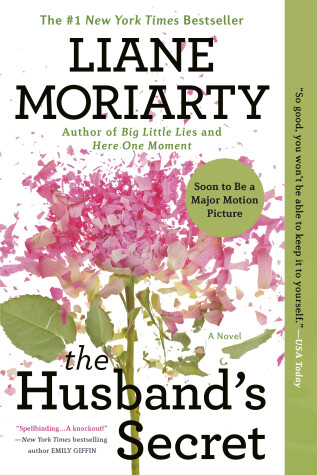Reviewed by girlinthepages on
A few weeks ago I posted about craving some adult fiction to break up the mini-slump I felt I had fallen into with YA books, where many of them felt as if they were blending together, and the themes and characters were becoming monotonous to read. The Husband's Secret was at the top of my adult fiction TBR list, and it's the first book I chose to pick up in 2016 from my Christmas book haul. I read a majority of this book in a small handful of hours while battling a cold, and it felt so good to be so engaged in the messy, metaphorical yet surprisingly ordinary lives of the characters that it was over before I knew it. The Husband's Secret reminded me why I love adult fiction so much, and how there can be so many literary and significant undertones in a book while still maintaining levity and attracting a mainstream audience.
First and foremost, let's discuss the main draw of the novel: the "secret." Cecilia finds a letter her husband has written to her to only be opened upon his death, although at the time she discovers it he is very much alive. Cecilia struggles with whether or not to open it for the first hundred or so pages, in which time the author lays the foundation of the three POV characters, three Australian women who are integrated in the same small community and who are all impacted by the content of the letter. I was a little disappointed that I was able to guess the "secret" in the letter so easily. I've found it's harder and harder to surprise me with plot twists in books these days, perhaps because I read so many. Once the secret was revealed I realized the book was taking a turn in an alternative direction than I had initially anticipated, focusing much more on character development and relationships rather than a mystery (for some reason the synopsis had me thinking this book was going to be Gone Girl-esque).
Although different from what I was initially expecting, I really loved The Husband's Secret. Sure, perhaps its plot wasn't the most unique I've ever read, but Moriarty's method of storytelling definitely had an original flair that I thought was incredibly skilled. The entire book is told by an almost omniscient third person narrator, who at times gives glimpses into the futures that could have been for many of the characters had made one different decision. The entire novel is haunted by the butterfly effect premise of knowing that the contents of the letter Cecilia finds impacts almost every single major and minor character of this book, from the elderly characters to the children. Toward the end of the book there's a brutal twist that brings everything from the past full circle in the cruelest of ironies. There was also the eerie parallelism with the Berlin wall, which helped to serve as a point of reference for the time jumps between the flashbacks and present day chapters. Moriarty pulled off the time jumps and multiple POVs quite well, with each woman's narrative feeling distinctive and unique at the same time. While Moriarty's prose wasn't the most lyrical I've read and didn't always stand out compared to other contemporary adult fiction authors, every so often I'd come across a quote that was such an intense observation of everyday life moments or feelings that were so accurate that it stunned me in its profound simplicity:
It wasn't logical, but the better you knew someone, the more blurry they became. The accumulation of facts made them disappear. -400
In the end, this book was almost a bit "lighter" than I was expecting. It dealt with a terrible secret to be sure, but it also dealt with the ugly realities, hard truths, and shallow desires of modern women in an upper middle class community. Moriarty wrote these nuanced, conflicted, sometimes neurotic and not always likable characters with a skilled hand, and despite their flaws I found myself deeply invested in their lives and even in their everyday rituals (I particularly enjoyed Cecilia, and her obsessively labeled Tupperware pantry).
Cecilia thought she'd experienced anger before, plenty of times, but now she knew that she'd had no idea how real anger felt. The white-hot burning purity of it. It was a frantic, crazy, wonderful feeling. She felt like she could fly. -174
Seeing the real conflict of emotions that these characters go through was believable and captivating, and I walk away feeling as if I really crawled into their lives for a time, which is not a feeling I often get after reading a stand alone, as one is really not with the characters for a long period of time.
Overall: The Husband's Secret is a highly character driven novel that delivers shocks and plot twists among a contemporary setting rather than a thriller or mystery background. It explores relationships between characters and between characters and emotions, from grief to passion to anger, in ways that I found unique and introspective in an already crowded genre. Most gripping for me was the premise of the novel being grounded in the "What if's" and almost parallel universe lives the characters could have gone on to live if such tiny changes had happened. I'll definitely be reading more by Liane Moriarty!This review was originally posted on Girl in the Pages
Reading updates
- Started reading
- 10 January, 2016: Finished reading
- 10 January, 2016: Reviewed
